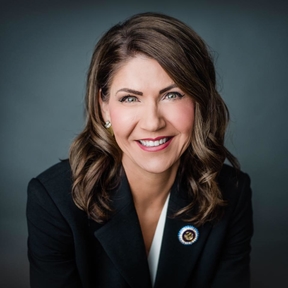(The Center Square) – Nine Republicans and one Democrat made the American Legislative Exchange Council’s list of 2021’s 10 best governors in a new report on economic freedom.
South Dakota Gov. Kristi Noem, Utah Gov. Spencer Cox and Florida Gov. Ron DeSantis – all Republicans – were the top three governors in the country, according to the joint report by the American Legislative Exchange Council and Economist Arthur Laffer & Associates.
The “2021 Laffer-ALEC Report on Economic Freedom: Grading America’s 50 Governors” ranked each governor on their current economic performance and their fiscal and executive policies over their term in office. Colorado Gov. Jared Polis, a Democrat, and Idaho Gov. Brad Little, a Republican, rounded out the top five. The others who made the top ten were Tennessee Gov. Bill Lee (6), New Hampshire Gov. Chris Sununu (7), Arizona Gov. Doug Ducey (8), Georgia Brian Kemp (9) and Texas Gov. Greg Abbott (10).
The bottom 10 were all Democrats: Michigan Gretchen Whitmer (41), Connecticut Gov. Ned Lamont (42), Pennsylvania Gov. Tom Wolf (43), Hawaii Gov. David Ige (44), New Jersey Gov. Phil Murphy (45), former New York Gov. Andrew Cuomo (46), Illinois Gov. J.B. Pritzker (47), California Gov. Gavin Newsom (48), Rhode Island Gov. Daniel McKee (49), and lastly New Mexico Gov. Michelle Lujan Grisham (50).
The report ranked governors based on three broad categories: Executive policies, economic performance and fiscal policy. Executive policies include union control, education freedom and welfare dependency. Economic performance included a range of metrics including interstate migration, education quality, Gross State Product growth and unemployment rate. Fiscal policy included debt, corporate income tax, personal income tax, government spending per capita and federal unemployment benefits. The metrics were different than the group’s 2020 report, which focused more heavily on COVID-19 lockdown policies, said Jonathan Williams, ALEC’s chief economist and contributor to the report. The American Legislative Exchange Council is a nonpartisan organization of state legislators focused on limited government, free markets and federalism.
The top 10 governors shared some common traits: Lower taxes, policies encouraging domestic energy production, lower unemployment rates and tended to be among those who cut off the enhanced federal unemployment benefits sooner rather than later, Williams said.
Polis even called for eliminating Colorado’s state income tax.
“I think that’s a pretty remarkable trait in this day and age, given where the national progressive wing has taken his party, that he would stand up for taxpayers and not just call for tax cuts, but call for the complete elimination of the state’s personal income tax,” Williams said. “When you contrast that with, in some cases, Republicans fighting other Republicans over how aggressively they should cut taxes or if they should eliminate their state’s income tax, like Mississippi is considering this session, and things like that, it is very notable that a Democrat like Jared Polis stands out.”
Williams said Polis also was helped by some of Colorado’s existing policies, including its Taxpayer Bill of Rights, a 1992 amendment to the state’s constitution that restricts the amount of revenue the state can retain and spend.
The top 10 is a competitive group, Williams said.
“There is a great group of governors in that top 10 and those states are really some of the powerhouse states across the country,” he said. “So sometimes the degree of difference between them may be very slight, but this is based on equal weighting of the variables.”
The bottom 10 includes the governors of five of the nation’s 10 largest states, including California, New York, Pennsylvania, Illinois and Michigan. The number of people living in California, New York and Illinois have been declining.
“There’s a lot of competition for the bottom,” Williams said. “They are looking to empower government to have a more command and control top-down economic system where it empowers politicians and not the markets, not business owners and individuals and of course, what we’re seeing is revealed preferences, that is what we call it in economics, people are voting with their feet every single year away from states like New York and California and Illinois.”
Originally published by The Center Square. Republished with permission.











